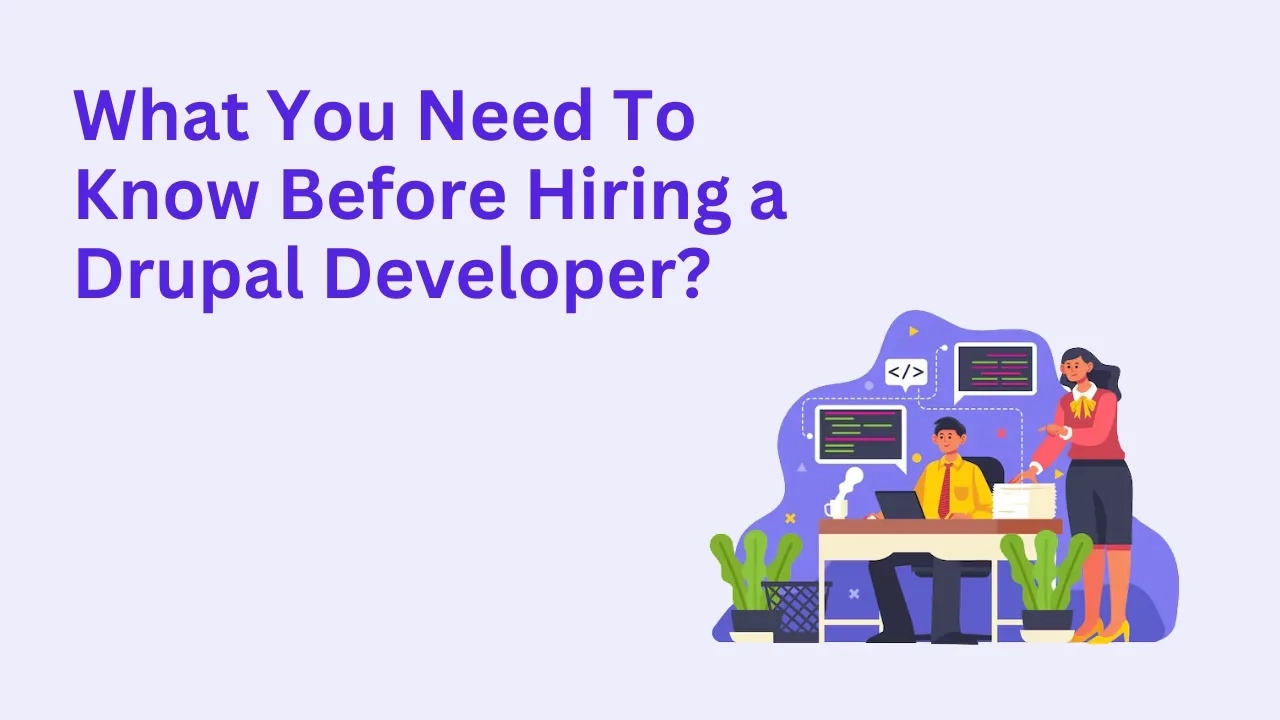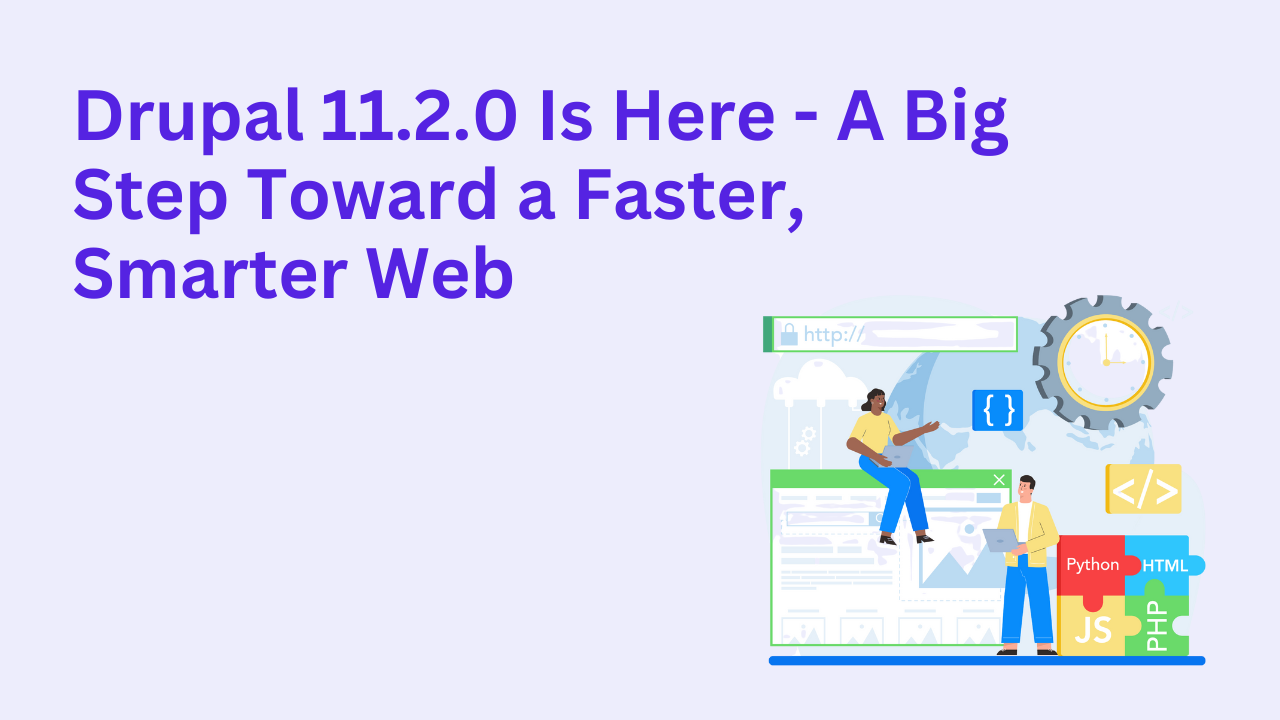What You Need To Know Before Hiring a Drupal Developer

What You Need To Know Before Hiring a Drupal Developer
Hiring the right Drupal developer can make or break your project. Whether you're building a new website or maintaining an existing one, the expertise of your developer is crucial. This blog explores everything you need to know before hiring a Drupal developer, from understanding key skills to evaluating candidates and avoiding common pitfalls.
Why Hiring the Right Drupal Developer Matters
Drupal is a powerful content management system (CMS) known for its flexibility and scalability. However, its complexity can pose challenges if you don’t have the right expertise. Here’s why hiring the right developer is important:
- Project Success: A skilled developer ensures that your project meets deadlines, stays within budget, and achieves desired outcomes.
- Cost Efficiency: Avoiding mistakes in the development phase can save you significant money down the line.
- Future Scalability: An experienced developer will build a robust and scalable website that can grow with your business.
Hiring the right talent ensures a seamless development process and a high-quality final product.
Essential Skills to Look for in a Drupal Developer
When hiring a Drupal developer, it’s crucial to evaluate their technical and soft skills. Here are the must-have skills:
1. Proficiency in Drupal Core and Modules
Your developer should:
- Understand Drupal’s core architecture.
- Be experienced in working with both contributed and custom modules.
- Know how to leverage modules like Views, Panels, and Paragraphs for custom functionality.
2. Expertise in PHP and Other Relevant Languages
Drupal is built on PHP, so mastery of this programming language is non-negotiable. Additionally, knowledge of:
- HTML5 and CSS3 for front-end development.
- JavaScript for creating interactive features.
- MySQL for database management.
3. Familiarity with Drupal Theming and Design
A strong developer should:
- Understand Drupal’s Twig templating engine.
- Be capable of customizing themes to align with your brand.
4. Security Best Practices
Drupal is highly secure, but improper configuration can expose vulnerabilities. Look for a developer familiar with:
- Regular security updates.
- Writing secure code to prevent SQL injection and cross-site scripting (XSS).
5. Communication and Collaboration Skills
Soft skills are equally important. The developer should:
- Communicate technical concepts clearly.
- Collaborate effectively with other team members, including designers and project managers.
Also read: How AI Will Change Drupal Web Development?
How to Identify the Right Drupal Developer for Your Project
1. Define Your Project Requirements
Before starting your search, be clear about what you need. Define:
- Project scope and goals.
- Desired features and functionalities.
- Budget and timeline.
This clarity will help you identify a developer with the right expertise.
2. Choose Between Freelancers and Agencies
Both options have pros and cons:
- Freelancers: Ideal for small projects with limited budgets. However, they may lack resources for complex projects.
- Agencies: Better suited for large, multi-faceted projects. They offer a team of experts but may be costlier.
Evaluate your needs to determine the best fit.
Also read : What Is Headless Drupal?
3. Conduct Technical Assessments
Test a developer’s skills with:
- Coding challenges.
- Reviewing past projects and code samples.
Focus on their ability to solve real-world problems.
4. Assess Their Portfolio
A developer’s portfolio reveals their experience and expertise. Look for:
- Projects similar to yours.
- Clean, functional, and visually appealing websites.
- Testimonials or references from past clients.
Also read: Drupal For E-commerce: Why It Is The Ideal Choice?
5. Ask the Right Questions During Interviews
Prepare targeted questions, such as:
- How do you approach custom module development?
- Can you share a challenging project and how you resolved it?
- How do you stay updated with the latest Drupal updates and trends?
Common Challenges in Hiring a Drupal Developer and How to Avoid Them
1. Lack of Clarity in Job Descriptions
Vague job postings attract unqualified candidates. Clearly outline:
- Required skills and experience.
- Project details.
- Expected deliverables.
2. Overlooking Soft Skills
Technical expertise isn’t enough. Ensure candidates can communicate and collaborate effectively.
3. Ignoring Compatibility with Your Team
Hire someone who aligns with your company’s culture and values. A harmonious team dynamic leads to better results.
4. Not Checking References
Always verify a candidate’s claims by speaking with previous clients or employers.
Cost Considerations When Hiring a Drupal Developer
The cost of hiring a Drupal developer varies based on factors like experience, location, and project complexity. Here’s what to expect:
1. Hourly Rates
- Junior Developers: $20 - $50/hour.
- Mid-Level Developers: $50 - $100/hour.
- Senior Developers: $100 - $200/hour.
2. Project-Based Pricing
For fixed-price projects, costs depend on:
- Scope and complexity.
- Timeline and deliverables.
3. Additional Costs
Factor in expenses like:
- Hosting and domain fees.
- Licenses for premium modules or themes.
- Ongoing maintenance and support.
Also read: Why You Need to Hire a Drupal Developer in 2025
How to Ensure a Smooth Onboarding Process for Your Drupal Developer
1. Provide Comprehensive Documentation
Share detailed information about:
- Project goals and requirements.
- Existing website architecture (if applicable).
2. Set Clear Expectations
Define:
- Roles and responsibilities.
- Deadlines and milestones.
- Communication protocols.
3. Use Collaboration Tools
Leverage tools like:
- Jira or Trello for project management.
- Slack or Microsoft Teams for communication.
- GitHub for version control.
Red Flags to Watch Out For When Hiring a Drupal Developer
1. Lack of Relevant Experience
Avoid candidates without a proven track record in Drupal development.
2. Unrealistically Low Rates
Quality work comes at a price. Extremely low rates often indicate inexperience or subpar skills.
3. Poor Communication Skills
If a candidate struggles to explain technical concepts, they may not be a good fit for your team.
4. Inability to Meet Deadlines
Check reviews or references for insights into a candidate’s reliability.
Benefits of Hiring a Skilled Drupal Developer
1. Faster Project Completion
Experienced developers work efficiently, saving you time and resources.
2. High-Quality Deliverables
Skilled developers ensure your website is:
- User-friendly.
- Secure.
- Scalable.
3. Reduced Maintenance Costs
Properly built websites require fewer fixes, reducing long-term maintenance expenses.
Final Thoughts on Hiring a Drupal Developer
Hiring the right Drupal developer is an investment in your project’s success. By understanding essential skills, conducting thorough evaluations, and avoiding common pitfalls, you can find a developer who aligns with your goals and delivers exceptional results. Remember, the time and effort you spend in the hiring process will pay off in the form of a robust, high-performing website.








